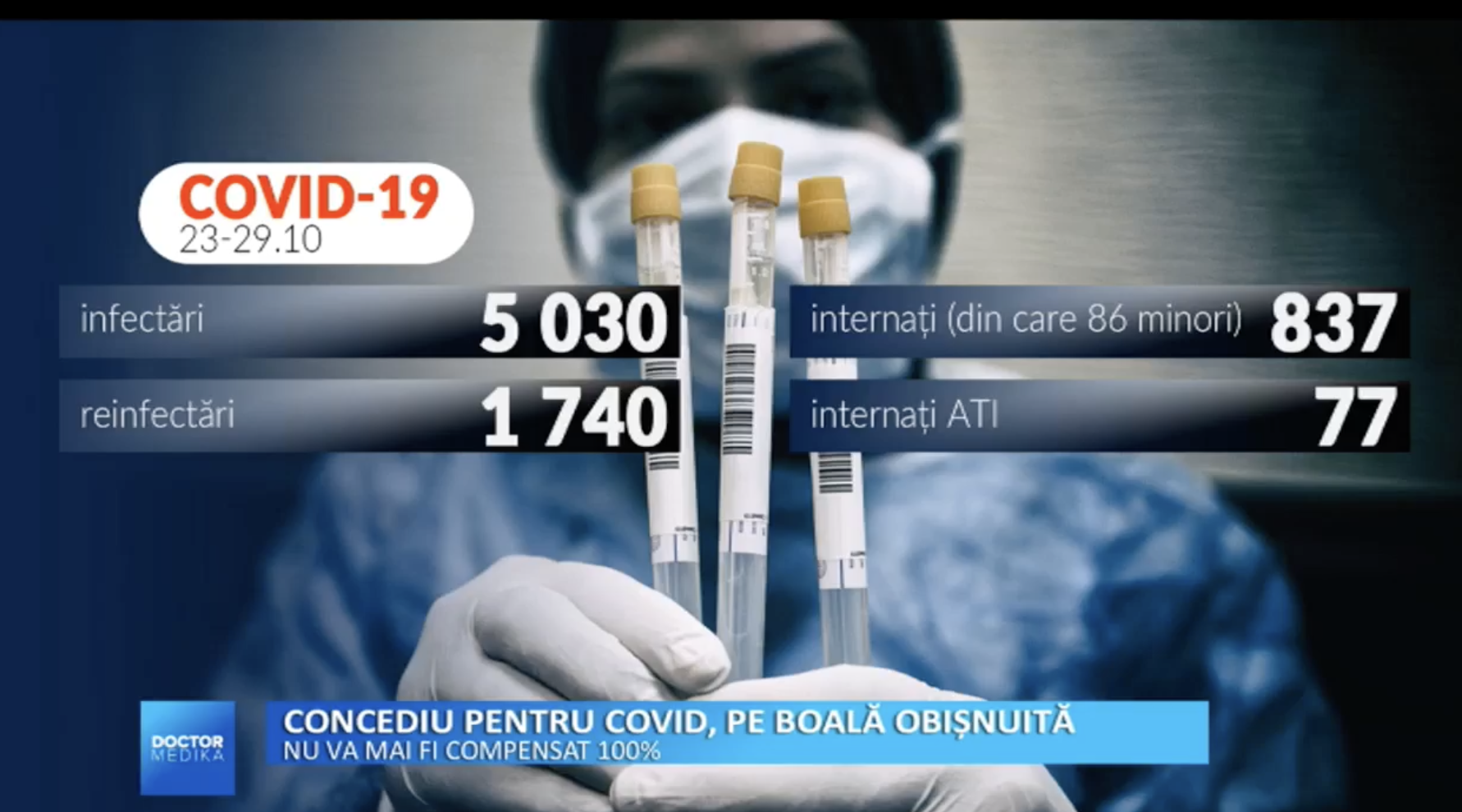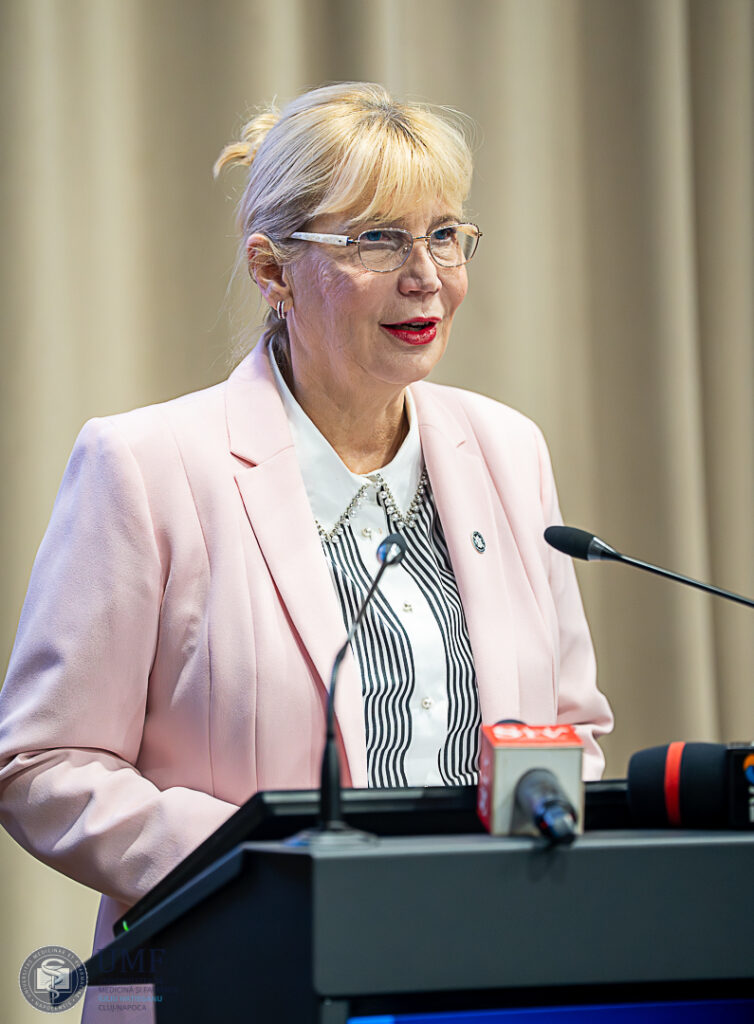Printr-un act normativ adoptat în urmă cu o săptămână, boala COVID-19 a devenit una obișnuită. Iar noul statut a adus cu el și o serie de modificări în ceea ce privește eliberare concediilor medicale, dar și a modului în care se va face pe viitor evaluarea pacienților. Medicii de familie au vorbit, la Medika TV, despre acest noi modificări.
La „Sistemul Medikal” s-a dezbătut situația privind încadrarea bolii COVID-19 ca boală obișnuită și impactul pe care decizia, legiferată printr-o Ordonanță de Urgență, o are asupra pacienților. Astfel, aceștia vor beneficia de concediu medical pentru o boală obișnuită, nu se vor mai putea testa gratuit pentru COVID-19, iar plata indemnizațiilor pentru concediile medicale va fi suportată de către angajatori. Medicii de familie, cei responsabili să elibereze documentele, susțin faptul că noile modificări sunt încă neclare și netransparente.
„ Nu există informații clare. Noi am solicitat lămuriri de la Casa de Sănătate, lămuriri cu privire la modalitatea în care se acordă aceste concedii. Am înțeles că în țară, câteva Case de Sănătate au înștiințat deja medicii că aceste concedii nu se mai acordă pe stilul vechi, se vor acorda ca pentru o boală obișnuită. Ce înseamnă asta pentru pacienți? În trecut, concediul pentru COVID-19 se acorda la sfârșitul perioadei de izolare, era plătit 100% și era plătit direct din banii Casei de Sănătate. Dacă se trece pe boală obișnuită se va plăti 75% și trebuie acordat în prima zi de îmbolnăvire, în prima zi a consultului la medicul de familie. Angajatorii sunt cei care plătesc primele 5 zile de concediu medical în cazul bolilor obișnuite. Casa de Sănătate nu va mai plăti aceste concedii, nu va mai plăti testarea gratuită a pacienților și nu va mai plăti monitorizările zilnice ale medicilor de familie” susține dr. Mihai Mara, medic de familie în județul Cluj.
În schimb, la București, medicii de familie au o cu totul altă opinie. „Am primit astăzi o informare de la Casa de Asigură în care ni s-a spus că se va modifica legislația. Iată că legislația ne spune că boala COVID-19 a devenit o boală virală obișnuită, sezonieră sau nu, dar care se supune acelorași reguli precum alte boli virale, așa cum este gripa. Eu cred că este justificată această modificare. Era de așteptat ca și legislația privind izolarea și concediile medicale să se modifice la rândul lor. Izolarea nu mai este obligatorie, este doar recomandată” a explicat, într-o intervenție în direct la Medika TV, dr. Evelyn Cristescu, medic de familie Bucuresti.
În ultima săptămână, la nivel național, Institutul Național de Sănătate Publică a confirmat peste 5000 de cazuri de COVID-19.
How Casinozoid Documents the Growth of Australian Online Gaming
Australia’s online gaming landscape has undergone remarkable transformation over the past two decades, evolving from a nascent digital frontier into a sophisticated and regulated industry. Understanding this evolution requires comprehensive documentation and analysis, which platforms like Casinozoid have undertaken to provide clarity on market developments, regulatory changes, and technological advancements that have shaped the current gaming environment.
The Early Digital Gaming Era in Australia
The foundation of Australia’s online gaming industry traces back to the late 1990s and early 2000s, when internet penetration began reaching critical mass across the continent. During this formative period, the regulatory framework remained largely undeveloped, creating a complex environment where international operators could serve Australian players with minimal oversight. The Interactive Gambling Act of 2001 marked the first significant legislative attempt to address online gaming, establishing fundamental principles that would influence the industry’s trajectory for decades.
Casinozoid’s documentation reveals that between 2001 and 2010, the Australian market experienced substantial growth despite regulatory uncertainties. Player adoption rates increased by approximately 300% during this period, driven primarily by improved internet infrastructure and the proliferation of personal computers in Australian households. The platform’s analysis indicates that early adopters were predominantly male professionals aged 25-45, with significant concentrations in major metropolitan areas including Sydney, Melbourne, and Brisbane.
The technological limitations of this era significantly influenced gaming preferences and operator strategies. Dial-up internet connections and limited bandwidth meant that simple table games and basic slot machines dominated the market. Flash-based gaming platforms became the standard, though their limitations would later drive the industry toward more sophisticated solutions. Casinozoid’s research demonstrates that average session times during this period were considerably shorter than contemporary standards, typically ranging from 15-30 minutes due to connectivity constraints.
Regulatory Evolution and Market Maturation
The period from 2010 to 2017 witnessed unprecedented regulatory evolution that fundamentally altered Australia’s online gaming landscape. The introduction of enhanced consumer protection measures and stricter licensing requirements created a more structured environment for both operators and players. Casinozoid’s comprehensive tracking of these developments illustrates how regulatory clarity gradually improved market confidence and encouraged more sophisticated operators to enter the Australian market.
Mobile technology emergence during this period created new opportunities and challenges for the industry. Smartphone adoption rates in Australia reached 85% by 2015, compelling operators to develop mobile-optimized platforms and applications. Casinozoid’s analysis reveals that mobile gaming sessions increased by 450% between 2012 and 2016, with tablet usage also contributing significantly to overall market growth. This shift fundamentally altered player behavior patterns, enabling more frequent but shorter gaming sessions throughout the day.
The regulatory landscape became increasingly complex during this maturation phase, with various state and territory governments implementing different approaches to online gaming oversight. Resources such as an Australian casino guide became essential for players navigating this evolving environment, providing crucial information about licensed operators, regulatory compliance, and consumer protection measures. The establishment of the Australian Communications and Media Authority’s enhanced oversight role in 2016 marked a significant milestone in creating a more transparent and accountable industry framework.
Payment processing innovations during this period also contributed significantly to market growth. The introduction of secure digital wallet systems, cryptocurrency options, and streamlined banking integrations reduced friction in the deposit and withdrawal process. Casinozoid’s documentation shows that transaction completion times decreased by an average of 60% between 2012 and 2017, while security incidents related to financial transactions dropped substantially due to improved encryption and verification protocols.
Contemporary Developments and Industry Sophistication
The modern era of Australian online gaming, beginning around 2017, has been characterized by unprecedented technological sophistication and regulatory refinement. Live dealer gaming, virtual reality integration, and artificial intelligence-powered personalization have transformed the player experience from basic digital recreations to immersive, interactive environments that rival traditional casino experiences. Casinozoid’s ongoing documentation reveals that player engagement metrics have increased dramatically, with average session times now exceeding 90 minutes and return visit rates reaching above 70% for established operators.
The COVID-19 pandemic accelerated many existing trends while creating entirely new market dynamics. Casinozoid’s analysis of 2020-2022 data shows that new player registrations increased by 180% during lockdown periods, with a notable demographic shift toward older players and increased female participation. Remote work arrangements and social distancing measures drove demand for digital entertainment options, fundamentally expanding the addressable market beyond traditional gaming demographics.
Technological infrastructure improvements have enabled increasingly sophisticated gaming experiences. The rollout of 5G networks across major Australian cities has facilitated seamless mobile gaming with console-quality graphics and real-time multiplayer functionality. Casinozoid’s technical analysis indicates that connection stability issues, once a major player complaint, have decreased by over 85% since 2018. Cloud gaming technologies have also emerged as a significant trend, allowing operators to deliver high-quality experiences without requiring substantial device-side processing power.
Responsible gaming initiatives have become increasingly sophisticated during this contemporary period. Advanced analytics and machine learning algorithms now enable operators to identify potentially problematic gaming patterns and implement intervention measures proactively. Casinozoid’s documentation shows that voluntary self-exclusion rates have increased by 40% since 2019, suggesting improved awareness and accessibility of responsible gaming tools rather than increased problem gambling rates.
Data Analytics and Market Intelligence
Casinozoid’s approach to documenting Australian online gaming growth relies heavily on comprehensive data collection and analysis methodologies. The platform aggregates information from multiple sources including operator reports, regulatory filings, consumer surveys, and technological adoption metrics to create a holistic view of market development. This multi-faceted approach enables identification of trends that might not be apparent through single-source analysis.
Market segmentation analysis reveals significant regional variations in gaming preferences and adoption rates across Australia. Urban centers demonstrate higher adoption of innovative gaming formats and mobile platforms, while regional areas show stronger preference for traditional game types and desktop platforms. Casinozoid’s geographic analysis indicates that per-capita gaming expenditure varies by as much as 300% between different Australian states and territories, influenced by factors including disposable income levels, internet infrastructure quality, and local cultural attitudes toward gaming.
The platform’s longitudinal studies have identified cyclical patterns in player behavior that correlate with economic conditions, seasonal factors, and major sporting events. These insights have proven valuable for understanding market dynamics and predicting future trends. For instance, Casinozoid’s analysis shows that gaming activity typically increases by 25-30% during winter months and decreases during major holiday periods when alternative entertainment options become more accessible.
Technological adoption tracking represents another crucial component of Casinozoid’s documentation efforts. The platform monitors the integration of emerging technologies including blockchain systems, artificial intelligence, augmented reality, and advanced security protocols. This comprehensive tracking enables identification of technological trends before they achieve mainstream adoption, providing valuable insights for industry stakeholders and regulatory bodies.
The comprehensive documentation efforts undertaken by Casinozoid provide invaluable insights into the remarkable transformation of Australia’s online gaming industry. From its humble beginnings in the early 2000s to the sophisticated, regulated market of today, this evolution reflects broader technological and social changes across Australian society. The platform’s ongoing analysis continues to illuminate emerging trends and developments that will shape the industry’s future trajectory.














